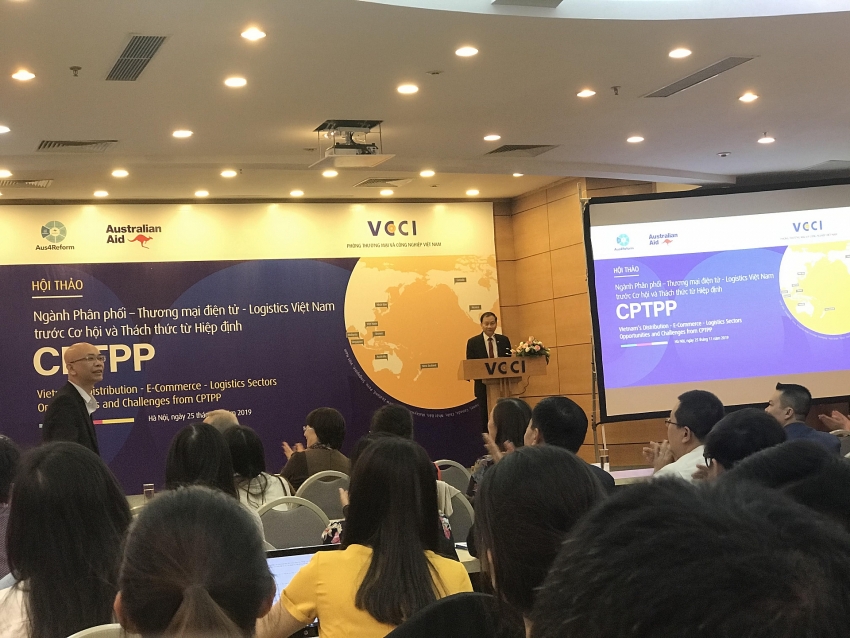CPTPP impacts on distribution, e-commerce, and logistics
 |
| The conference on the future of distribution, e-commerce, and logistics sectors after the CPTPP |
The last day of 2018 marked the CPTPP (the version of the Trans-Pacific Partnership Agreement without the US) officially coming into effect, creating a free trade area that accounts for about one-tenth of the world economy.
Ngo Chung Khanh, deputy director of the Multilateral Trade Policy Department of the Ministry of Industry and Trade, noted that the two main points in the CPTPP are the opt-out principle and the ratchet mechanism. The opt-out principle is to list the services that are not to be opened unconditionally to foreign investors, while the remaining areas are fully opened. This rule causes concerns over the country making a commitment without clarifying the legal framework to regulate it in the future.
The ratchet mechanism only allows policy adjustment in favour of businesses. Khanh gave the example of the foreign ownership limit in the aviation business. According to Decree 89, foreign investors are allowed to increase their capital to 34 per cent in airlines (compared to the previous 30 per cent). In the future, the managers will not be allowed to adjust the ratios below 34 per cent.
In this October, Amazon Global Selling was officially launched in Vietnam with the role of supporting and creating conditions for Vietnamese people to access markets in many countries around the world. Ngo Chung Khanh said that Vietnam has yet to grant a license for the domain name amazon.com.vn, so the CPTPP will not impact its business. The problem, however, is how to control the cross-border movement of goods to ensure compliance with the laws of the affected countries.
The Vietnamese retail market has developed quite strongly in recent years. In 2018, total retail sales of consumer goods and services were estimated at nearly $4.4 quadrillion ($191.3 billion), up 11.7 per cent compared to 2017. This is the highest increase in the past five years. Regarding e-commerce, the market size in 2018 reached $7.8 billion, up 30 per cent on-year and doubling against 2015.
On the World Bank rankings, Vietnam currently ranks 64th out of 160 countries in logistics development and is the fourth in the ASEAN after Singapore, Malaysia, and Thailand, with an annual growth rate of 16-20 per cent, becoming one of the fastest-growing and most stable service industries in Vietnam.
The CPTPP contains remarkable commitments on distribution, logistics, and e-commerce, promising many development opportunities for Vietnamese enterprises.
However, at the conference Vietnam’s Distribution – E-commerce – Logistics Sectors themed Opportunities and Challenges from the CPTPPtaking place on November 25, Dinh Thi My Loan, chairwoman of the Association of Vietnam Retailers (AVR), said that businesses in the retail industry are divided into three groups.
The first group is afraid because they have not been provided with enough information. In fact, many businesses are still confused about the many international agreements the country has signed, concerned that they have created better conditions for foreign competitors. In addition, there are also widespread claims that the Vietnamese retail industry is in the hands of foreign giants.
The second group are indifferent to the CPTPP, mainly because of the agreement's length and highly specialised content, while businesses need to resolve more urgent issues.
It is only the third group that has adequate knowledge of the CPTPP and are proactively moving forward to compete.
Talking about the impacts of the CPTPP on e-commerce, Nguyen Thanh Hung, chairman of Vietnam E-Commerce Association (VECOM) stated, “In the short term, the impact of the CPTPP on e-commerce is unclear, however, in the long term, the effects are immense. Thanks to the CPTPP, e-commerce has become clear, predictable, creating Vietnam E-Commerce Association in the Asia-Pacific."
Thereby, Nguyen Thi Thu Trang, director of the WTO and Integration Center of the Vietnam Chamber of Commerce and Industry (VCCI), said that pressure on businesses will come from competition, management mechanisms, infrastructure, and governance capacity. Trang also emphasised that international trade agreements always create pressure that lead to changes in competitiveness. Businesses, especially in the manufacturing industry, instead of seeing pressure, must see opportunities for breakthrough.
What the stars mean:
★ Poor ★ ★ Promising ★★★ Good ★★★★ Very good ★★★★★ Exceptional
Related Contents
Latest News
More News
- Foreign leaders extend congratulations to Party General Secretary To Lam (January 25, 2026 | 10:01)
- 14th National Party Congress wraps up with success (January 25, 2026 | 09:49)
- Congratulations from VFF Central Committee's int’l partners to 14th National Party Congress (January 25, 2026 | 09:46)
- 14th Party Central Committee unanimously elects To Lam as General Secretary (January 23, 2026 | 16:22)
- Worldwide congratulations underscore confidence in Vietnam’s 14th Party Congress (January 23, 2026 | 09:02)
- Political parties, organisations, int’l friends send congratulations to 14th National Party Congress (January 22, 2026 | 09:33)
- Press release on second working day of 14th National Party Congress (January 22, 2026 | 09:19)
- 14th National Party Congress: Japanese media highlight Vietnam’s growth targets (January 21, 2026 | 09:46)
- 14th National Party Congress: Driving force for Vietnam to continue renewal, innovation, breakthroughs (January 21, 2026 | 09:42)
- Vietnam remains spiritual support for progressive forces: Colombian party leader (January 21, 2026 | 08:00)

 Tag:
Tag:

























 Mobile Version
Mobile Version